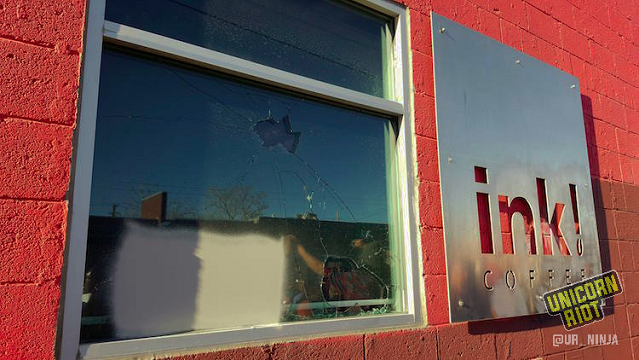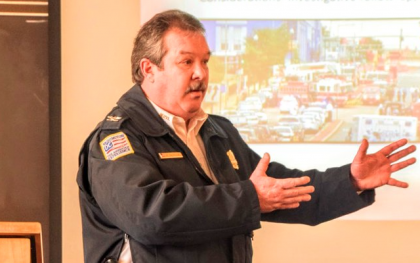Longtime Denver Community Residents Boycott ink! Coffee
Denver, CO – On Saturday, November 25, 2017, over 200 people rallied outside of ink! Coffee shop on Larimer Street in downtown Denver to show their opposition to the shop’s recent advertising displays.
Unicorn Riot provided live coverage of the community responses to the incidents around ink! Coffee. Watch our live feed from the Saturday rally below:
https://vimeo.com/374777616
https://vimeo.com/374776872
The sign pictured below was spotted outside of ink! Coffee on Wednesday, November 22.
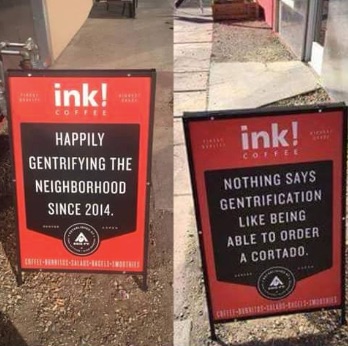
The front reads: “Happily gentrifying the neighborhood since 2014,” and the back: “Nothing says gentrification like being able to order a cortado.”
Immediately, Denver residents took to social media to express their upset over the sign, which was crafted by advertising agency Cultivator Advertising & Design.
yo @inkcoffee we are not cool with this sign on 29th and Larimer. Bad decision. Bad design. BAD. W.T.F. pic.twitter.com/81UkXfM9kh
— La Suprema Pistola (@theperfectRu) November 22, 2017
Don’t you just love it when businesses that cater to well to do white folks make light of people of color being displaced from their neighborhoods? Shame on you @inkcoffee . pic.twitter.com/pbffUfeSg2
— Black Aziz Anansi (@Freeyourmindkid) November 22, 2017
A reminder that @inkcoffee‘s pro-gentrification stance is also pro-colonization, pro-white supremacy and pro-oppression. Bye, bye Ink Coffee. Your racist business isn’t welcome in #Denver
— Bree Davies (@CocoDavies) November 22, 2017
I grew up in Denver when Five Points was a neglected Black neighborhood with a rich history as the “Harlem of the West.” @InkCoffee was dead wrong, and an apology is the least they owed that community. Gentrification isn’t an adorable marketing strategy. https://t.co/5t9Te8SJl7
— Joy Reid (@JoyAnnReid) November 24, 2017
Hey, @greatdividebrew @newbelgium and @ChipotleTweets, you should drop @CultivatorAds as your ad agency. They have no respect for the victims of Denver’s gentrification or our historically redlined communities. RT https://t.co/wL4Myj4Sn2
— Andrea Mérida Cuéllar (@andreamerida) November 23, 2017
Also a short film about the ink! Coffee sign was made by two Denver locals called “GENTRICOFFEE.”
Candi Cdebaca, local activist who is a fourth generation Denver resident, expressed her upset on Facebook:
Perfect opening to ‘thanks-taking’ weekend. Open your eyes people these gentrifiers are modern colonizers and they just put out a thinly veiled ‘whites only’ sign right in our community. I don’t know about you but this is not something to sweep under the rug. Wrong hood. These are fighting words.”
At the rally on Saturday, longtime leaders and residents of the Five Points neighborhood, renamed RiNo by developers, spoke out about the sign.
Justine Sandoval, community organizer and activist whose family has lived in the Curtis Park neighborhood for nearly a century, said:
One of the things I really want to address is the conversations of people asking why we are so upset. That this was a joke…There’s this misconception that businesses that have come into here suddenly brought us a neighborhood and we’ve even heard it from people like developers Ken Wolf, who have said ‘we created a community.’ First of all, this is Denver’s first neighborhood, okay, it’s the absolutely first neighborhood, so you didn’t bring a community, a community has been here.”
She went on to say:
And prior to businesses that have shown up here now, there have been businesses before, there have been lots of businesses down Larimer Street. So there is nothing new coming in here. So if anyone asks why we’re upset, we’re upset because these businesses coming in, they come and think that they’re bringing us something, that savior complex of saving our neighborhood.”
In November 2016, developer Ken Wolf told Westword:
In places like Highland, you have neighborhoods that were run down back in the ’80s and became gentrified. Here, we’re creating a neighborhood. We’re creating in this core not just bars and restaurants, but other services — clothing stores and hair salons…
I know people who live in Denver Country Club, and this is their new place to go on the weekends. People like RiNo because it’s hip — but until recently, it was a bunch of bars. Now there’s a sushi restaurant, a karaoke bar, First Draft, Central Market — these are one-of-a-kind places. So this is not only for the people who live here; it’s bringing a whole variety of people into the neighborhood.”
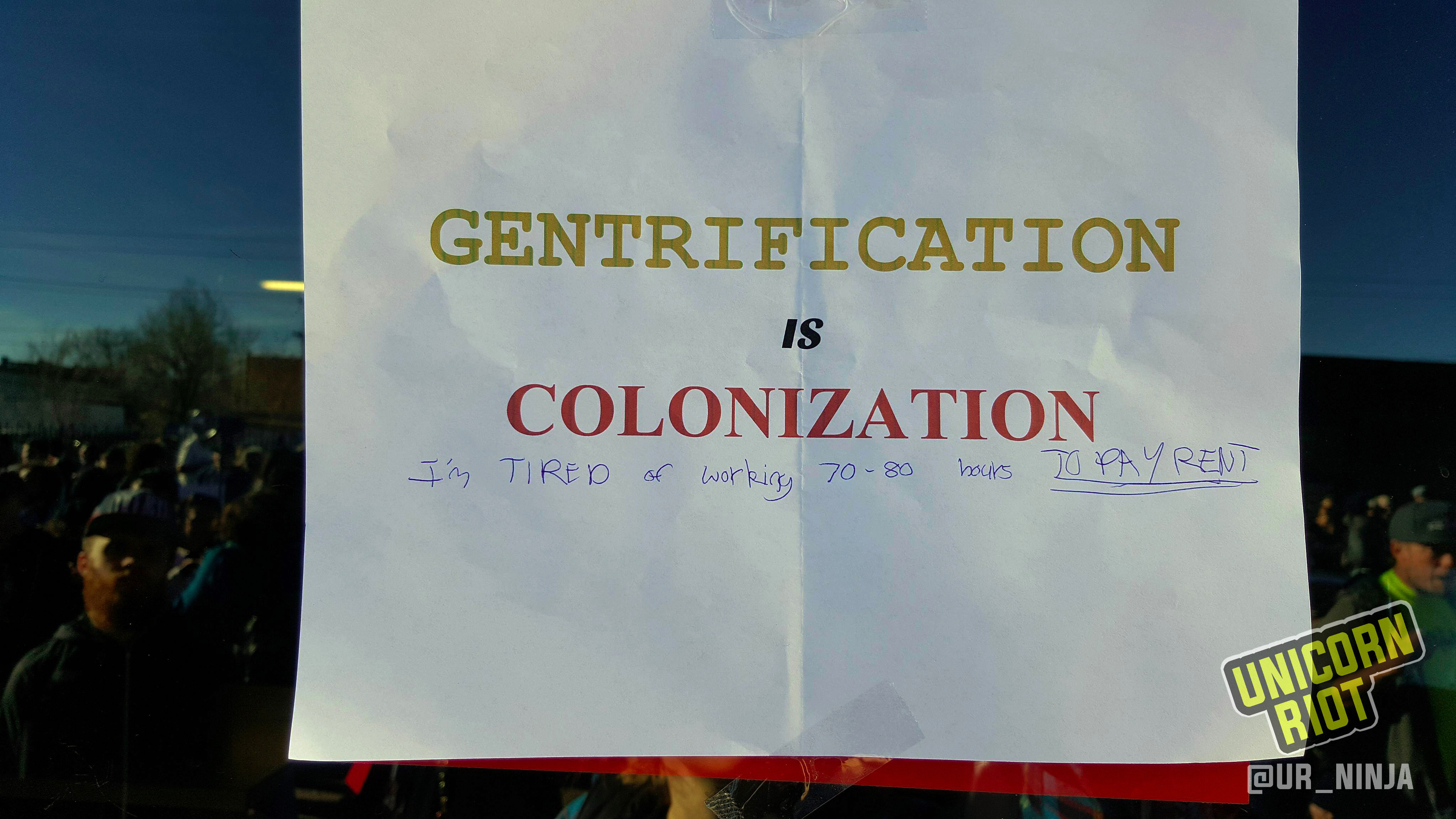
Lisa Calderón, Denver chapter co-chair of the Colorado Latino Forum, spoke at the rally:
This is not about a sign, the sign is symbolic of what is going on with our neighborhoods… We have a message for our political leaders: you have failed us. When it comes to economic opportunity in this neighborhood, you have failed us. You have left us out. You have left us behind.”
She went on to say:
There’s a boarded-up building across the street. Do you think that’s gonna go to a minority business owner? Folks of color? We know it’s going to developers. We are pushing our elected officials to stop lining their pockets with development money and start listening to the people…
When you rename our historic community highlands, slohi, lohi, RiNo, you are defacing our community. Stop erasing our history. Stop erasing our people.”
Denver City Council President Albus Brooks, who is also the city council representative for District 9, which includes Five Points, is in fact lining his pockets with development money. Below is a report by the Denver Elections Division published on March 30, 2017, showing 2016 campaign contributions to Brooks. Out of the $51,750 he received, 83% came from developers, real estate companies, bankers, and lobbyists.
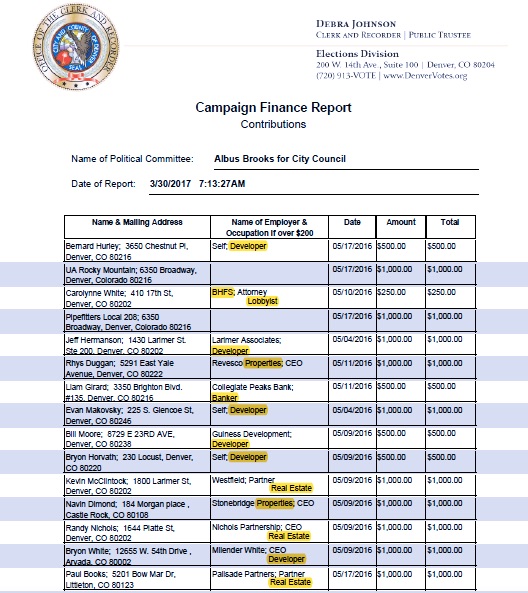
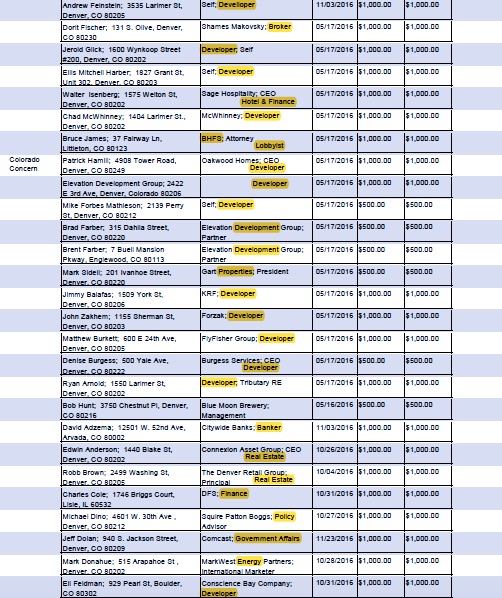
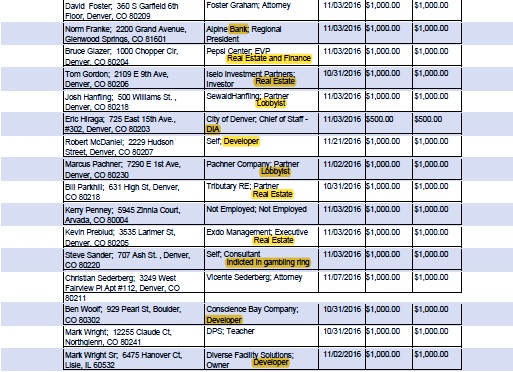

Denver’s Mayor Michael Hancock also has his pockets lined thick with campaign contributions from gentrifying entities. In fact, out of the $76,950 he received in 2016, 79% was from developers, real estate companies, bankers, and lobbyists. Below is a report by the Denver Elections Division published on January 12, 2017.
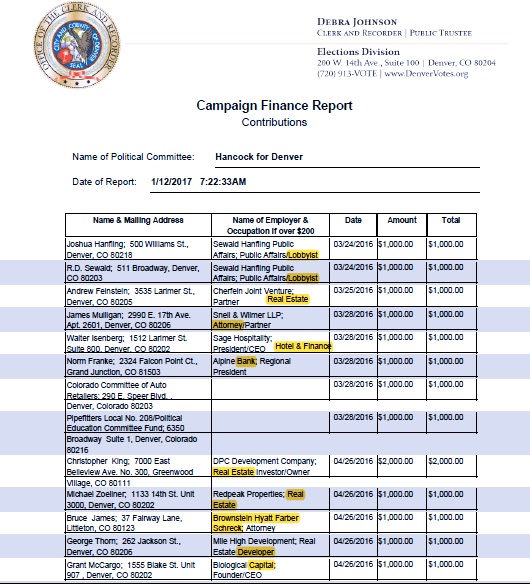
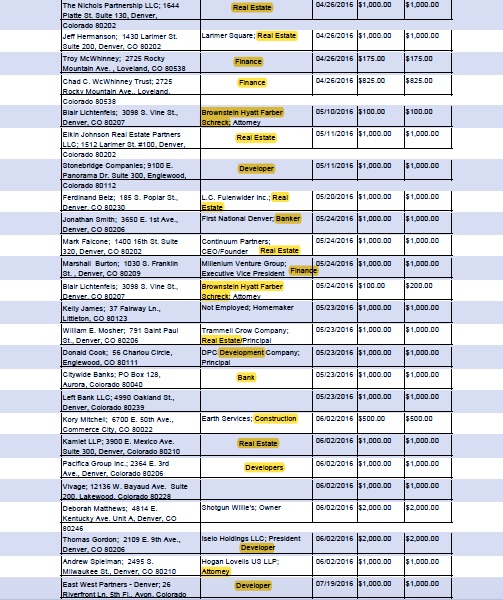
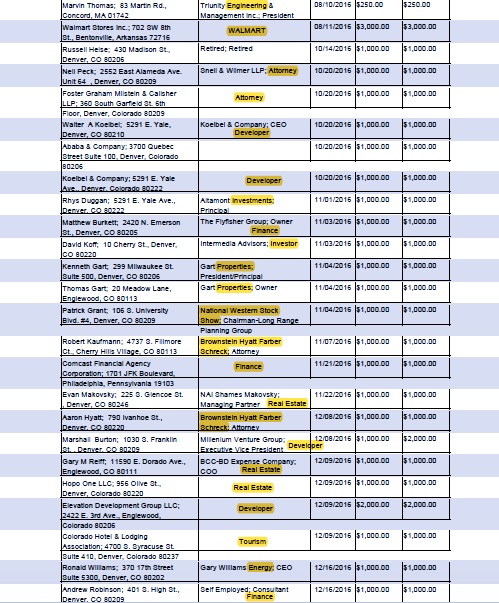
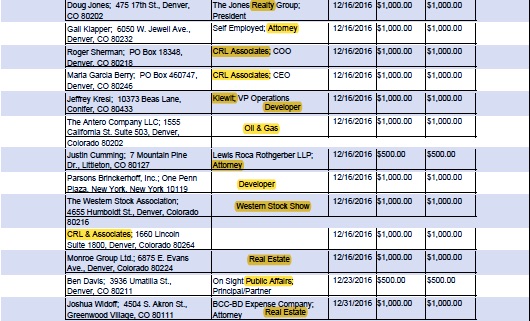
One of the largest one-time donations ($2,000) to Hancock in this report was by Deborah Matthews who owns Shotgun Willie’s. Shotgun Willie’s is a strip club that is currently facing a class-action lawsuit for essentially stealing their employee’s money. The attorney for the four dancers who filed the lawsuit told Westword:
The dancers had to pay to be allowed to work, they had to pay for the dances they did, and they had to share their tips with other workers. So even as they were not being paid, they were required to pay some of the tips they received from customers to other employees.” – Mari Newman
Another contentious incident with Shotgun Willie’s occurred on November 28, 2017, less than a week after the signs outside ink! Coffee. The show club advertised the following message on their digital sign outside their establishment:
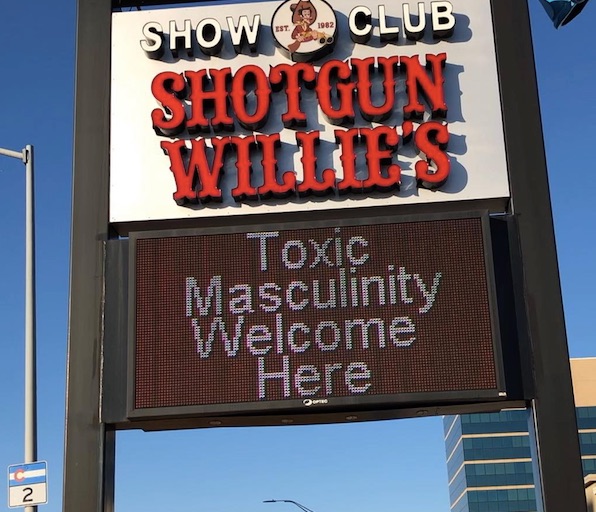
The sign reads: “Toxic Masculinity Welcome Here.”
Evidently the longtime residents of Five Points are correct that Denver’s Mayor will accept any campaign contributions no matter the ethics behind the dollar signs, and no matter how harmful the contributing entities are to the community.
On Wednesday, November 22, ink! Coffee posted the following “apology”:
Hmmm. We clearly drank too much of our own product and lost sight of what makes our community great. We sincerely apologize for our street sign. Our (bad) joke was never meant to offend our vibrant and diverse community. We should know better. We hope you will forgive us.”
The post has since been deleted and a new, longer post is in its place.
Sometime during Wednesday evening, the outside of ink! Coffee was spray painted with the words “White coffee,” and rocks seem to have been thrown at one of the windows.
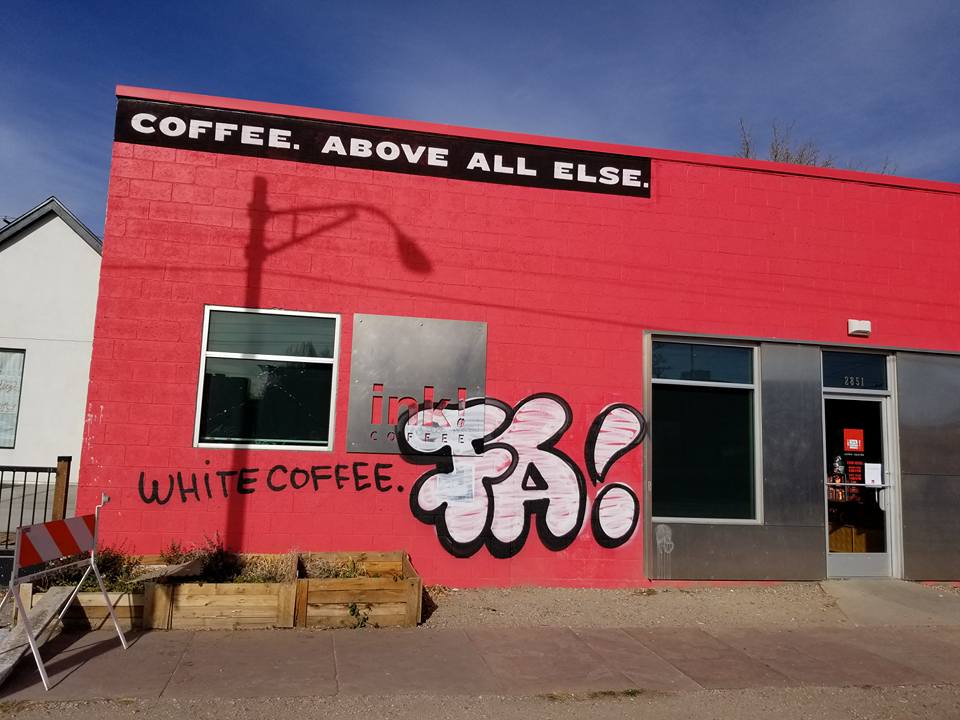
The spray paint was painted over before the We Don’t Drink ink! rally.
One of the last speakers at the rally was Victor Galvan, who has spent much of his life being pushed out of neighborhoods from gentrification, including Five Points.
I’m a first-generation immigrant to this country. The one thing that I dreamt of doing was setting roots and I have never been able to set roots in this community because of the gentrification, the fierce gentrification of this community. Just in this neighborhood alone, I can name five different homes that I lived in… I have moved, that I can remember, 16 times. These people don’t understand what it means to live out of a box. Because your belongings are never really unpacked. They don’t understand having a separate bank account for first and last months rent and for the down payment that you’ll never get back from the renter.”
He concluded:
They don’t understand that pain of always constantly having to rebuild from the bottom up. Having to constantly meet new people and make new friends. I don’t have childhood friends because I moved so often. I don’t have a childhood home because I moved so often. And I know that a lot of us have the same problem, that we’ve become transient at the expense of these people. We have had to sacrifice so much so that people like ink! Coffee could survive.
These laws, these incentives for developers are wrong. We need to establish rent protection in this city. We need to get rid of anti-camping laws here in the city. It very well may be one of us that ends up camping on one of these streets because we know how expensive Denver is getting and how expensive it’s gonna be if we don’t stand up right now.”
The neighborhood of Five Points is a prime example of the constant cycle of red-lining, green-lining, and rapid gentrification in Denver. From the 1920s-1950s, known as the “Harlem of the West,” it was a thriving community with a rich mix of business and commerce along the Welton Corridor.
Five Points became a predominantly African American neighborhood because discriminatory home sale laws in other neighborhoods forbade Black people from settling in them. The area was seen as a haven, not only for Black people, but for Mexicans and Mexican Americans, as well as, Japanese American residents who found an alternative to internment during World War 2.
However, with the successes of desegregation and with more money and resources being pumped into new neighborhoods, urban flight caused the population of Five Points to drop dramatically from 32,000 in 1959 to 8,700 in 1974. Property was cheap and abandoned, and thus displacement of long-time residents by affluent newcomers was imminent.
According to the Five Points Business District website, “In May 2008, [the district] was selected by the City of Denver’s Office of Economic Development (OED) to be a pilot district for a program designed to strengthen business districts and their surrounding neighborhoods citywide.”
It is clear from listening to the longtime residents of Five Points that the Office of Economic Development has systematically shut them out of economic decisions and opportunities in their neighborhood. Therefore when the city’s goal is to “strengthen business districts,” it consists of encouraging businesses like ink! Coffee to move in; attracting new people and pushing out the existing people.
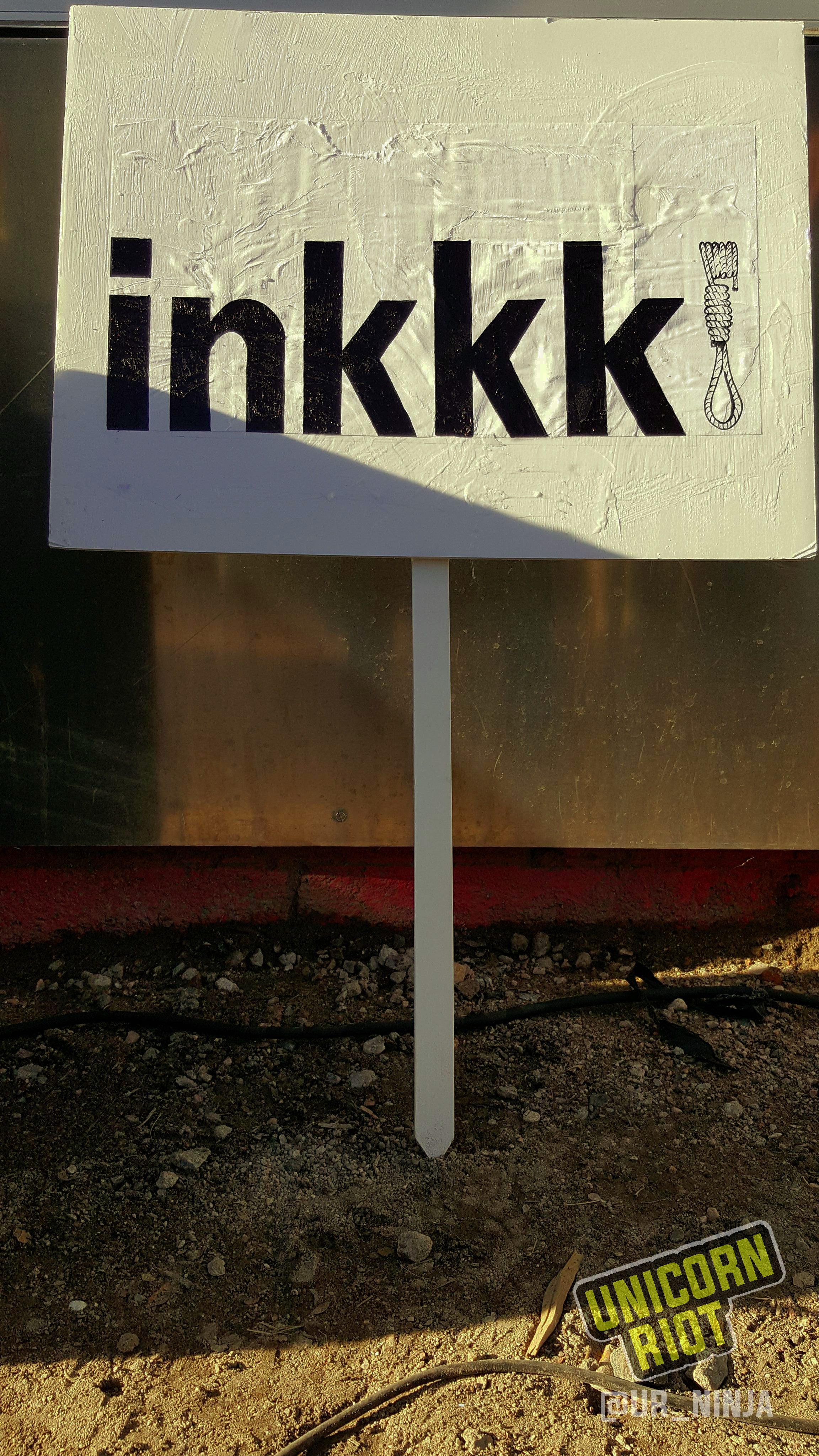
On November 23, the NAACP released a statement admonishing ink! Coffee and calling for a Monday, November 27 rally:
With racial tensions growing out of control in our nation, it is sad that newcomers to communities that were once predominately people of color are insensitive to the history, as well as the families who reside there.
Today, Ink Coffee decided to add gasoline to the gentrification flame that has been stirring around Denver’s Black historic neighborhood known as Five Points. The coffee shop located at 2851 Larimer Street, Denver, CO 80205, decided it would find humor in the loss of a community that still has open wounds from the impact of gentrification…
The NAACP Denver Branch is calling the community to join in a protest on Monday, Nov. 27th at 7:30 a.m. Please help the community to put an end to Ink Coffee by asking those who patron there to find alternative places to purchase their cup of joe.
Social Justice cannot be silent. Social Justice must speak and act to put an end to inequality.”
Since the first large rally outside ink! Coffee on November 25, there have been people rallying outside the “happily gentrifying” business nearly every day since, because to the longtime residents of Five Points, gentrification is not a joke.
Gentrification is about being able to have the capital to displace people who cannot afford to stay.” – Candi Cdebaca
Unicorn Riot will continue to cover this story as more unfolds.
To help our volunteer-operated, horizontally-organized, non-profit media collective please consider a tax-deductible donation:
